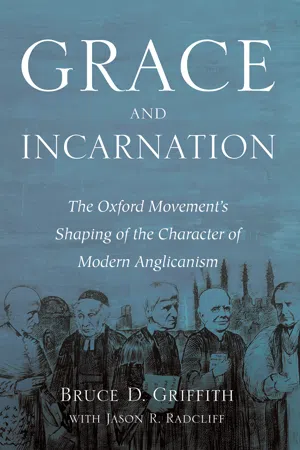![]()
1
Justification, Sanctification, and Regeneration
The Revival of Dispute
Two controversies are generally acknowledged as being at the center of Anglican theology in the late eighteenth and early nineteenth centuries, the Calvinist controversy and the baptismal regeneration controversy. They were not new controversies in the history of Anglican doctrine; both had been issues since the English Reformation. The names of most Churchmen associated with the revival of these disputes have slipped into obscurity. A few are recognized today, but usually for contributions to the social order rather than for their theological positions. William Wilberforce, the great reformer, Charles Simeon, the supporter of the missions to India, John Newton, the hymn writer; all were active Churchmen who contributed to the rise of the Evangelical party in the Church of England. L. E. Binns once wrote of the Evangelical movement that it was “one of the offshoots of the great Methodist revival of the eighteenth century.” Binns correctly perceived that the Evangelicals drew their great enthusiasm from the Methodists, but he missed another equally important point: the early Anglican Evangelicals were not Methodist in their theology, they were convinced Calvinists.
The source of the early Evangelicals’ Calvinism remains somewhat mysterious. While there were conforming Calvinists among the clergy of the English Church in the eighteenth century, there are no names that leap to mind as Calvinists of high repute. From the Restoration to the mid-eighteenth century Calvinist theology was hardly evident in Anglicanism. Then, hand in hand with the Methodist movement, Calvinism re-enters the life of the Church of England as the theological stance of the early Evangelicals.
One of the earliest Evangelicals, William Romaine, provides a good example of the style and content of early Evangelical preaching. In a sermon on justification, while attempting to convince his hearers of the depravity of their nature and condition, he wrote:
Mankind, asserts Romaine, deserves no justification, nor is there any inherent principle within it that would make it seek God. Only an awakening to a sense of sin, a sense of utter, total depravity, can make man desire God; a desire about which man can do nothing. One must simply cast himself on Christ’s merits. But how, then, is a man to be righteous? Romaine answers:
Romaine was one of the first to reintroduce a strong doctrine of forensic justification. Forensic justification, the notion that we are justified through an external imputation of the merits of Christ (an imputation that seems to be best defined as an exchange), had a long history in Anglican theology. It was an obvious feature of the doctrine of justification held by the Reformers. It obviously was the dominant opinion of the Thirty-nine Articles. Yet, it was the early Evangelicals who reintroduced the English Church to the doctrine of forensic justification. Romaine was not alone in this; indeed, the more famous John Newton of Olney was equally insistent on the point.
Little difference in theology can be found between Newton and Romaine, but Newton’s second interest, hymn writing, provides another insight into the early Evangelicals. Second only to preaching Newton viewed hymn singing as a powerful new instrument of evangelization. His greatest production in this area was the “Olney Hymns.” None are now in use, and only a few of his later hymns have survived and are in common use. “Glorious things of thee are spoken” is not a typical Newton hymn, but “Amazing grace” and “How sweet the name of Jesus sounds” are both typical and popular. Newton’s hymns were always theologically explicit, and in one from the “Olney Hymns” we gain a sense of the supreme role of preaching in the Evangelical tradition:
It is the spoken word that maintains the contact between man and God. The grace of perseverance is bound to hearing that spoken word.
Perhaps Newton’s greatest contribution to the Evangelical Movement was his careful and patient conversion of Thomas Scott. Scott finally succeeded Newton at Olney, and after an unproductive decade moved to London to become one of the key figures of the Evangelical Movement. The range of his influence is evidenced by the fact that Newman cites Scott as one of the writers who most influenced his early years. Scott served as the first secretary of the infant Church Missionary Society, founded a college for missionaries to India at Bedlow, and wrote powerfully in the Evangelical tradition.
Unlike Romaine and Newton, Scott felt that the doctrine of predestination was not central in the exposition of Christian doctrine, but he clung tenaciously to solifidian teaching. In an essay on justification he defended the forensic interpretation of the terms “to justify” and “justification” in St. Paul, but sought to broaden the scope of justification. While there is no reason to believe that Newman was influenced by this tendency in Scott, it is interesting to note that Newman, too, wished to broaden the interpretation of justification.
Scott adroitly separates the term justification from forgiveness of sins (the latter being too restrictive), and then writes:
